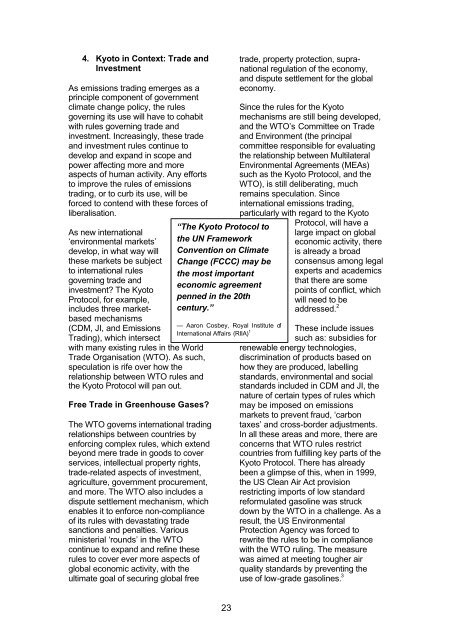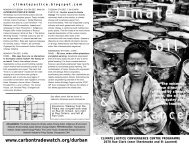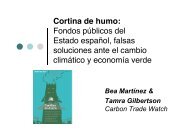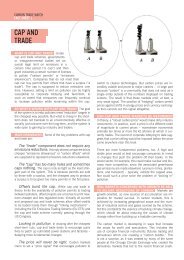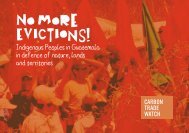The Sky is Not the Limit: - Carbon Trade Watch
The Sky is Not the Limit: - Carbon Trade Watch
The Sky is Not the Limit: - Carbon Trade Watch
- No tags were found...
You also want an ePaper? Increase the reach of your titles
YUMPU automatically turns print PDFs into web optimized ePapers that Google loves.
4. Kyoto in Context: <strong>Trade</strong> andInvestmentAs em<strong>is</strong>sions trading emerges as aprinciple component of governmentclimate change policy, <strong>the</strong> rulesgoverning its use will have to cohabitwith rules governing trade andinvestment. Increasingly, <strong>the</strong>se tradeand investment rules continue todevelop and expand in scope andpower affecting more and moreaspects of human activity. Any effortsto improve <strong>the</strong> rules of em<strong>is</strong>sionstrading, or to curb its use, will beforced to contend with <strong>the</strong>se forces ofliberal<strong>is</strong>ation.As new international‘environmental markets’develop, in what way will<strong>the</strong>se markets be subjectto international rulesgoverning trade andinvestment? <strong>The</strong> KyotoProtocol, for example,includes three marketbasedmechan<strong>is</strong>ms(CDM, JI, and Em<strong>is</strong>sionsTrading), which intersectwith many ex<strong>is</strong>ting rules in <strong>the</strong> World<strong>Trade</strong> Organ<strong>is</strong>ation (WTO). As such,speculation <strong>is</strong> rife over how <strong>the</strong>relationship between WTO rules and<strong>the</strong> Kyoto Protocol will pan out.Free <strong>Trade</strong> in Greenhouse Gases?<strong>The</strong> WTO governs international tradingrelationships between countries byenforcing complex rules, which extendbeyond mere trade in goods to coverservices, intellectual property rights,trade-related aspects of investment,agriculture, government procurement,and more. <strong>The</strong> WTO also includes ad<strong>is</strong>pute settlement mechan<strong>is</strong>m, whichenables it to enforce non-complianceof its rules with devastating tradesanctions and penalties. Variousmin<strong>is</strong>terial ‘rounds’ in <strong>the</strong> WTOcontinue to expand and refine <strong>the</strong>serules to cover ever more aspects ofglobal economic activity, with <strong>the</strong>ultimate goal of securing global free“<strong>The</strong> Kyoto Protocol to<strong>the</strong> UN FrameworkConvention on ClimateChange (FCCC) may be<strong>the</strong> most importanteconomic agreementpenned in <strong>the</strong> 20thcentury.”— Aaron Cosbey, Royal Institute ofInternational Affairs (RIIA) 1trade, property protection, supranationalregulation of <strong>the</strong> economy,and d<strong>is</strong>pute settlement for <strong>the</strong> globaleconomy.Since <strong>the</strong> rules for <strong>the</strong> Kyotomechan<strong>is</strong>ms are still being developed,and <strong>the</strong> WTO’s Committee on <strong>Trade</strong>and Environment (<strong>the</strong> principalcommittee responsible for evaluating<strong>the</strong> relationship between MultilateralEnvironmental Agreements (MEAs)such as <strong>the</strong> Kyoto Protocol, and <strong>the</strong>WTO), <strong>is</strong> still deliberating, muchremains speculation. Sinceinternational em<strong>is</strong>sions trading,particularly with regard to <strong>the</strong> KyotoProtocol, will have alarge impact on globaleconomic activity, <strong>the</strong>re<strong>is</strong> already a broadconsensus among legalexperts and academicsthat <strong>the</strong>re are somepoints of conflict, whichwill need to beaddressed. 2<strong>The</strong>se include <strong>is</strong>suessuch as: subsidies forrenewable energy technologies,d<strong>is</strong>crimination of products based onhow <strong>the</strong>y are produced, labellingstandards, environmental and socialstandards included in CDM and JI, <strong>the</strong>nature of certain types of rules whichmay be imposed on em<strong>is</strong>sionsmarkets to prevent fraud, ‘carbontaxes’ and cross-border adjustments.In all <strong>the</strong>se areas and more, <strong>the</strong>re areconcerns that WTO rules restrictcountries from fulfilling key parts of <strong>the</strong>Kyoto Protocol. <strong>The</strong>re has alreadybeen a glimpse of th<strong>is</strong>, when in 1999,<strong>the</strong> US Clean Air Act prov<strong>is</strong>ionrestricting imports of low standardreformulated gasoline was struckdown by <strong>the</strong> WTO in a challenge. As aresult, <strong>the</strong> US EnvironmentalProtection Agency was forced torewrite <strong>the</strong> rules to be in compliancewith <strong>the</strong> WTO ruling. <strong>The</strong> measurewas aimed at meeting tougher airquality standards by preventing <strong>the</strong>use of low-grade gasolines. 323


